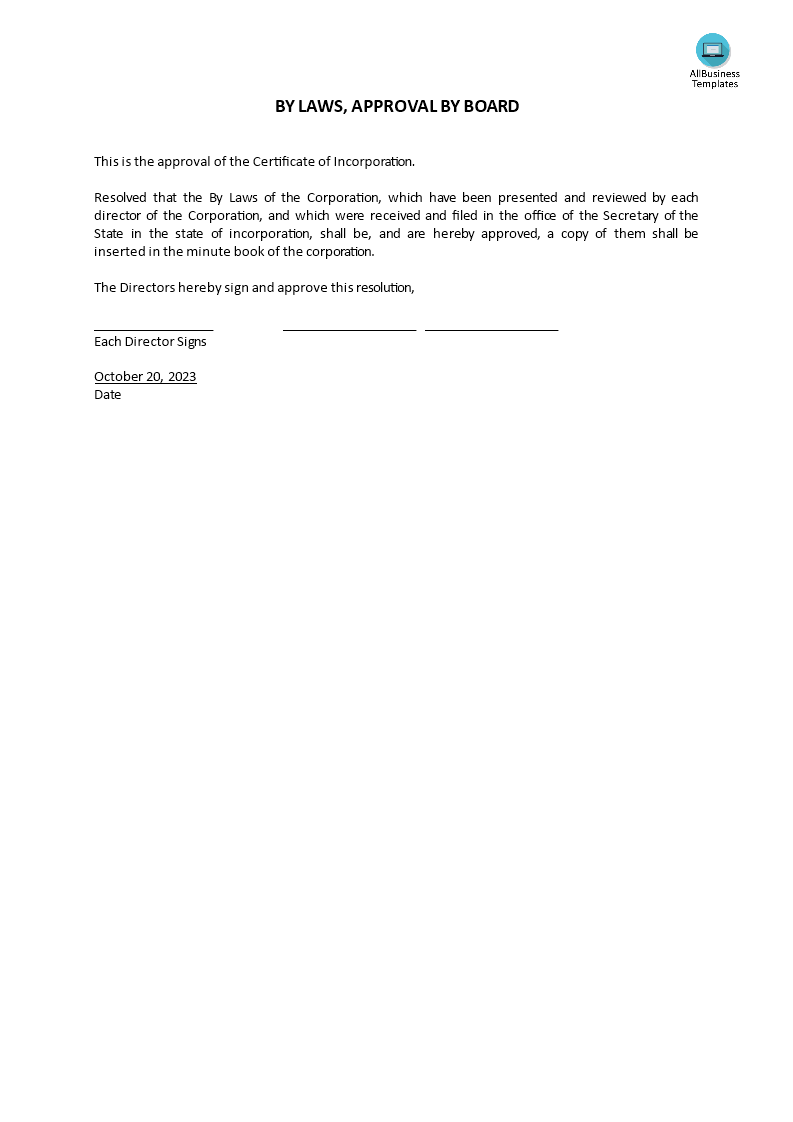ByLaws, Approval by Board
Save, fill-In The Blanks, Print, Done!

Download ByLaws, Approval by Board
Today: USD 2.99
Download It Now

Available premium file formats:
Microsoft Word (.docx)- This Document Has Been Certified by a Professional
- 100% customizable
- This is a digital download (23.46 kB)
- Language: English
- You will receive a link to download the file as soon as your payment goes through.
- We recommend downloading this file onto your computer.
How to write a bylaws approved by the Board? In what way are the bylaws intended to serve the interests of our organization? We have a comprehensive template that outlines the roles and responsibilities of each board member and the necessary steps for approving by-laws. Download this Approval by Board ByLaws now!
The term bylaws, approval by board refers to the process by which a corporation's board of directors formally approves or amends the company's bylaws. Bylaws are a set of rules and regulations that govern the internal operations, management, and decision-making processes of a corporation. They outline the rights and responsibilities of shareholders, directors, and officers and provide a framework for corporate governance.
Here is an overview of the key components and significance of bylaws approved by the board:
- Drafting or Amending Bylaws: The initial drafting of bylaws or any proposed amendments to existing bylaws is typically prepared by legal counsel or corporate officers. These documents are crucial in defining how the corporation will conduct its affairs.
- Board Review: Before bylaws are adopted or amended, they are typically reviewed and discussed by the corporation's board of directors. The board may hold meetings or engage in discussions to ensure that the proposed bylaws align with the corporation's goals and comply with legal requirements.
- Approval Process: The board of directors must formally approve the proposed bylaws or amendments through a resolution or vote during a board meeting. The approval process usually requires a majority vote of the board members, as specified in the corporation's existing bylaws or state corporate law.
- Documentation: The approval by the board is documented in the form of meeting minutes or a written resolution. These documents record the decision to adopt or amend the bylaws and may include details of the discussions that took place during the board meeting.
- Filing and Implementation: Once approved by the board, the new bylaws or amendments become legally binding for the corporation. In some jurisdictions, corporations may be required to file their bylaws with the state's business authority or corporate registrar.
- Communication: After approval and implementation, it is important to communicate the new or amended bylaws to all relevant stakeholders, including officers, employees, and shareholders. This ensures that everyone is aware of the rules governing the corporation's operations.
- Compliance: The corporation must adhere to the bylaws as approved by the board. Failure to do so can lead to legal and governance issues.
Bylaws serve as an internal roadmap for a corporation's operations and decision-making. They cover a wide range of topics, including the composition and powers of the board of directors, shareholder voting rights, the election of officers, meeting procedures, and other governance matters.
Download this professional legal By-Laws, Approval by Board template if you find yourself in this situation and save yourself time, and effort and probably reduce some of the lawyer fees! Using our legal templates will help you reach the next level of success in your education, work, and business! However, we still recommend you to consider consulting a local law firm in case of doubt to support you in this matter.
DISCLAIMER
Nothing on this site shall be considered legal advice and no attorney-client relationship is established.
Leave a Reply. If you have any questions or remarks, feel free to post them below.
Related templates
Latest templates
Latest topics
- Excel Templates
Where do I find templates for Excel? How do I create a template in Excel? Check these editable and printable Excel Templates and download them directly! - GDPR Compliance Templates
What do you need to become GDPR compliant? Are you looking for useful GDPR document templates to make you compliant? All these compliance documents will be available to download instantly... - Google Docs Templates
How to create documents in Google Docs? We provide Google Docs compatible template and these are the reasons why it's useful to work with Google Docs... - IT Security Standards Kit
What are IT Security Standards? Check out our collection of this newly updated IT Security Kit Standard templates, including policies, controls, processes, checklists, procedures and other documents. - Letter Format
How to format a letter? Here is a brief overview of common letter formats and templates in USA and UK and get inspirited immediately!
cheese
